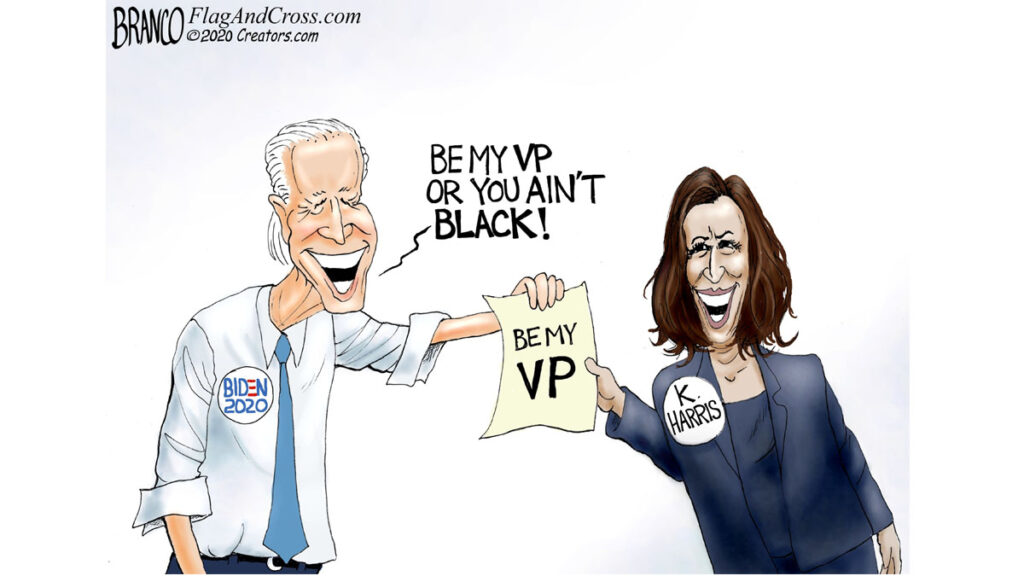President Trump recently attacked Vice President Harris for race flip-flopping. He called her out for claiming to be Black at times and Indian at other times. While his manner in raising the issues was clumsy, off the mark and needlessly controversial, he may have touched upon a touchy but legitimate issue.
It is not a matter of Harris’ genetic background – or even how she refers to herself. The valid political issue is how voters view Harris – especially Black voters to whom she is attempting to appeal on a racial basis.
Before examining the political ramifications of Harris’ claims, let us look at what she IS biologically, ethnically, or genetically. Let us start with the basic facts. Harris’ mother is Indian. That makes Harris one-half Indian and an Asian according to the map. Harris’ father is a Black Jamaican – although most Black Jamaicans (such as my daughter) have some Caucasian ancestry.
While Harris has Negro ancestry, she is not specifically African American within the greater Black community. Most White folks are not familiar with the cultural divide in the Black community between African Blacks and Islander Blacks. It often rises to the level of disdain for each other. Many islander Blacks resent being called African Americans.
(On a personal note, a Black female friend of the family – of African ancestry – would occasionally refer to my Jamaican Black daughter derisively as “that island girl.”)
Like my daughter, Harris’ paternal ancestors may have come from Africa as part of the slave trade, but that was hundreds of years. Their genetic and cultural ties to Africa have given way to unique assimilation as Jamaicans over those many years.
There is also a cultural and social difference between oppressed Blacks in the urban segregated ghettos and establishment Blacks raised in the comfort and advantages of America’s greater opportunity society. While privileged Blacks often talk about a monolithic Black experience, a lot of those successful Blacks you see on the news programs have little common experience with those trapped in the ghettoes.
Trump is not entirely wrong in questioning Harris’ appeal to the greater Black community –especially the African Black community. But he misses the real issue by focusing on Harris herself. The real issue is how some Blacks may view Harris.
Several days before Trump brought up the issue in his typical maladroit manner, I wrote this concerning Harris’ potential outreach for Black voters.
“Some argue that she will “bring home” Black voters who are now shifting to Trump. That may not be the case. Harris is not as popular among African American Blacks as one might think. First of all, she is half Indian – and tends to accentuate that part of her ancestry with frequent public statements about her mother.
Harris has a white husband. While it is not something we hear about in open conversation, there are a lot of folks in the Black community who do not like mixed marriages. They see that as a form of racial rejection.
White liberals—without much direct experience in the Black community – see everyone with dark skin as one culture, that is not how the various cultures see themselves. In fact, there is also a cultural divide between the so-called African Blacks and the Caribbean “islanders.”
Many Black voters are critical of Harris’ days as California Attorney General, when she was very aggressive in sending young Black men to prison. This is significant since it is the young Black male voters she would have to win back.
Interestingly, CNN interviewed a number of Black men – asking if they considered Harris’ to be Black in the traditional sense. Every one of them said, “no.”
Conversely, Harris says she self-identifies as Black in the traditional meaning of that description based on her life experience. She is Black because she was raised in the Black lane. Harris says her mother raised her to be Black. She attended an Historically Black College and University (HBCU) institution. That may give her some legitimacy for the claim, but it may not satisfy those Black voters who do not see her as one of them.
I assume that Trump was attempting to respond to the fact that a lot of Black voters are not enamored with Harris, and who do not view her as a “sister” in the colloquial sense. If so, he did not handle the issue very well – to say the least.
“Black” and “people of color” are political terms used to manipulate populations. They have no basis in biology, genetics or ethnicity. They are arbitrarily applied by politicians, academicians, social planners and individuals themselves. It Is based on something as simple as how dark you look – or conversely the existence of some ancestor, no matter how you look.
(I can relate to the latter since my DNA shows Nigerian blood. That may explain why my Austrian dad had black curly hair. But I digress.)
We are often told not to judge a person by the color of their skin – and for the most part, we Americans do not. But the one exception is voting – and such ethnic solidarity is largely (though not exclusively) found in the Black community. Those are the folks to whom Harris is attempting to appeal. But even in the greater Black community, there are subcultures that limit Harris’ appeal. That is the issue political strategists have to examine.
Harris is what she Is in terms of genetics and socialization. The political issue is how various voters might respond to what she is – and that cuts both ways.
So, there ‘tis.
